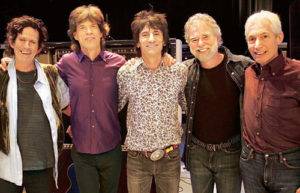This edition of Off the Deaton Path’s podcast: Robert Johnson, Jim Croce, The Blues, the Devil, Lynching, Notable Passings, Fun Facts Known By Few, The Worst Invention Known to Man, and so much more……
Category Archives: Culture
New Podcast: Ken Burns’ The Vietnam War
This week Stan previews Ken Burns’ new documentary The Vietnam War, which premieres this Sunday, September 17, on PBS.
New Podcast: College Football Preview
This week’s Off the Deaton Path podcast previews the action-packed College Football Season that begins this Labor Day weekend. Stan inflicts on gridiron-loving fans his previews, predictions, half-baked ideas and inane commentary about the Dogs, Jackets, and other big games in September. Click and enjoy.
Count Us In, Chuck
As long-suffering readers of this blog know well, I’ve had a long love affair with the Rolling Stones. I’ve seen them nine times in five different cities over the last 35 years, from the first time as a 17-year-old senior in high school to the last as a 50-year-old in the summer of 2015.
So imagine how Fan-Boy crazy I went when the Stones’ legendary keyboardist, Chuck Leavell, attended the Georgia Historical Society’s Trustees Gala in February in Savannah and yours truly got to sit with him at dinner. To say that I busted his chops would be an understatement. Turns out, he’s a huge fan of public television and was familiar with my own work on “Today in Georgia History.”
I first met Chuck for a few minutes when he gave the inaugural Mark Finlay Memorial Lecture 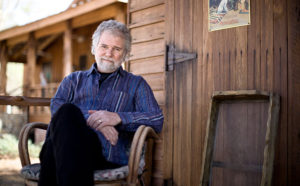 on environmental history at Armstrong State University in the spring of 2015. As you may know, Chuck and his wife Rose Lane turned her family’s plantation into a model tree farm outside Macon, and to say they’ve been good at it would be an understatement. They were jointly named National Outstanding Tree Farmers of the Year in 1999, and Chuck is the only two-time recipient of the Georgia Tree Farmer of the Year Award. The dedicated conservationist is the co-founder, with Joel Babbit, of the Mother Nature Network. In 2012 Chuck received a Lifetime Achievement Grammy for his work with the Allman Brothers Band as well as an Honorary Ranger award from the US Forest Service. Who else has done that? Take that Bob Dylan, with your Nobel Prize.
on environmental history at Armstrong State University in the spring of 2015. As you may know, Chuck and his wife Rose Lane turned her family’s plantation into a model tree farm outside Macon, and to say they’ve been good at it would be an understatement. They were jointly named National Outstanding Tree Farmers of the Year in 1999, and Chuck is the only two-time recipient of the Georgia Tree Farmer of the Year Award. The dedicated conservationist is the co-founder, with Joel Babbit, of the Mother Nature Network. In 2012 Chuck received a Lifetime Achievement Grammy for his work with the Allman Brothers Band as well as an Honorary Ranger award from the US Forest Service. Who else has done that? Take that Bob Dylan, with your Nobel Prize.
The husband, father, and grandfather is also an accomplished author of four books: Forever Green: The History and Hope of the American Forest; the autobiographical Between Rock and a Home Place; The Tree Farmer (a children’s book); and Growing A Better America.
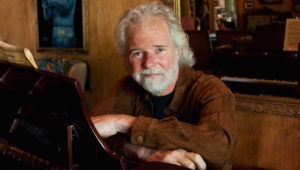 Besides his work with the Allman Brothers, Chuck’s recorded with Eric Clapton, George Harrison, the Black Crowes, Blues Traveler, Train, John Mayer, and many others, in addition to his own accomplished solo projects. The Alabama native attended the Georgia Historical Society’s Gala to honor Pete Correll, the longtime chief of Georgia Pacific and board member of the Mother Nature Network, who was appointed by Governor Deal and GHS as a Georgia Trustee this year.
Besides his work with the Allman Brothers, Chuck’s recorded with Eric Clapton, George Harrison, the Black Crowes, Blues Traveler, Train, John Mayer, and many others, in addition to his own accomplished solo projects. The Alabama native attended the Georgia Historical Society’s Gala to honor Pete Correll, the longtime chief of Georgia Pacific and board member of the Mother Nature Network, who was appointed by Governor Deal and GHS as a Georgia Trustee this year.
As in our first encounter, Chuck couldn’t have been more gracious. He is, in the words of Keith Richards, a gentleman through and through and as modest as they come. You’d never know he was at the heart of the Greatest Rock n’ Roll Band in the World, their keyboardist, erstwhile musical director, and the man who counts them in to nearly every song. Having been a Stones fan long before he became their keyboardist, Chuck in many ways is Mr. Everyman, standing in for all of us who love the band and their music dearly while spending the better part of a lifetime getting a nightly rear view—as Charlie Watts once indelicately put it—”of Mick’s bum wigglin’ about.”
And how’s this for coincidence: he made his debut with the Stones at their Atlanta concert in the Fox Theater on October 26, 1981—the first Stones concert I ever attended. Through the magic that is the internet, you can hear the soundboard recording of that magical night here.
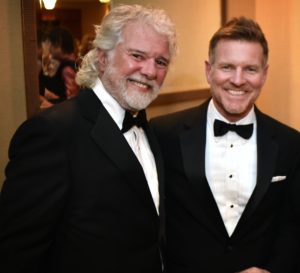 Without letting Chuck eat his dinner, I quizzed him about all things Stones, from how they stay so amazingly able to perform at such an advanced age (Mick exercises his body and voice relentlessly and rigorously watches his diet; Keith smokes and drinks), to Ronnie Wood’s newborn twins (for whom he’s given up smoking), to how long it’s all going to last. How do they first contact him to invite him to go on tour–does he look down at his cell and see Mick calling? (Sometimes, perhaps, but first the Stones’ manager Joyce Smyth sends out an email.) And so it went, on and on through every course. He answered my questions from the mundane to the sublime with unwavering politeness and an empty stomach.
Without letting Chuck eat his dinner, I quizzed him about all things Stones, from how they stay so amazingly able to perform at such an advanced age (Mick exercises his body and voice relentlessly and rigorously watches his diet; Keith smokes and drinks), to Ronnie Wood’s newborn twins (for whom he’s given up smoking), to how long it’s all going to last. How do they first contact him to invite him to go on tour–does he look down at his cell and see Mick calling? (Sometimes, perhaps, but first the Stones’ manager Joyce Smyth sends out an email.) And so it went, on and on through every course. He answered my questions from the mundane to the sublime with unwavering politeness and an empty stomach.
Many of my questions had to do with what they will and will not play live in concert, and why. As the group’s official “musical director” Chuck sets every show’s set list with Mr. Jagger and fights hard for songs that get rehearsed but rarely played live, like “Get off My Cloud” (hear Mick ask Chuck to count them in), “Lady Jane” and “Play with Fire.”
When I asked him why they don’t play early 60s standards like “Mercy, Mercy,” or “Walkin’ the Dog” live, he just laughed. He replied that people pay a lot of money to see them (don’t I know it!), and Mick and company feel they have to strike a delicate balance between playing familiar tunes like “Jumpin’ Jack Flash” that casual fans expect to hear, leaving little room for rarely played gems such as “She’s a Rainbow” and “Monkey Man” (both, incidentally, containing some of Chuck’s best work) for hard-core nuts like me.
Here’s what Chuck won’t tell you, though if you’ve followed the Stones during his tenure, you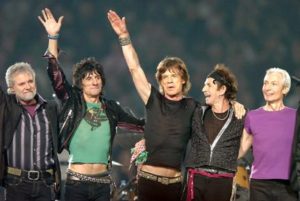 know it’s true: he’s made them a much better live band than they were before his arrival. They’re more professional, the songs are crisp and tight, giving their shows an energy and quality they lacked when everything was noticeably more ragged. In my opinion he’s a huge reason the band still plays to sold out audiences around the world well into their seventies.
know it’s true: he’s made them a much better live band than they were before his arrival. They’re more professional, the songs are crisp and tight, giving their shows an energy and quality they lacked when everything was noticeably more ragged. In my opinion he’s a huge reason the band still plays to sold out audiences around the world well into their seventies.
Chuck and Rose Lane have recently purchased a home in Savannah (not far from my office) and will be spending time here, so we’ll be neighbors for a few weeks each year.
The next sunny afternoon you stroll around Forsyth Park, you may see an unassuming white-haired, tree-farmer-looking gent walking beside you. If you pay him no mind and look the other way, you will miss the man who has been an integral part of musical history for the last third of a century and a well-respected member of rock royalty.
Take it from me: he won’t mind if you walk up and say, in Mick’s immortal words, “Please allow me to introduce myself….”
Tell him Stan said hello. And for all the pleasure—dare I say Satisfaction–you’ve given us through the years, Chuck, a heartfelt and sincere thank you. I like it, like it, yes I do.
Guilty as Charged
A lot of people in Atlanta took umbrage at Dan Shaughnessy’s column in the Boston Globe about how disappointed the New England Patriots must be in having to play the Falcons in the Super Bowl. He didn’t really say anything bad about the Falcons or Atlantans, oddly enough. The gist of his argument is that Atlantans aren’t die-hard professional sports fans (and thus aren’t worthy of a spot in the NFL’s big game), but are instead crazy about college football.
how disappointed the New England Patriots must be in having to play the Falcons in the Super Bowl. He didn’t really say anything bad about the Falcons or Atlantans, oddly enough. The gist of his argument is that Atlantans aren’t die-hard professional sports fans (and thus aren’t worthy of a spot in the NFL’s big game), but are instead crazy about college football.
Guilty.
Don’t get me wrong, I love and support all of Atlanta’s professional sports team, and have all of my life, as numerous of these tedious blog posts will attest. I stand second to none in my fanaticism for the Braves, Falcons, and Hawks. Heck, I even loved the long-defunct Atlanta Flames and still support them in Calgary. I know that they currently own the 8th and last playoff spot in the NHL’s Western Conference right at this red-hot second. Find three other people south of the Mason-Dixon line who care about that, I dare you.
But yes, college football is king here. And news flash: we aren’t alone.
The Northeast is the only place where the love of pro football wins out over the college game because, with the exception of Boston College (for whom our beloved Matty Ice played), there is no college football north of Philadelphia worthy of the name. Rutgers doesn’t count, despite playing—if you can call Rutger’s performance last year “playing”—in the Big Ten.
Combine that with the fact that the Patriots are really, really good—as are the other Boston teams usually—and it’s understandable why professional sports fans there are legion.
Our fanaticism here is not because of the dearth of professional championships in Atlanta sports.
It’s because college football is more exciting and more fun to watch, in my humble and uninformed opinion.
The rivalries are much more intense, and the game-day atmosphere at big-time college football games is unmatched in any other sport. Any. Shaughnessy referenced lack of excitement in Atlanta last April about a Celtics-Hawks playoff matchup (which the Hawks won, by the way). Is he kidding? Seriously? The NBA?
For game-day excitement, try the Big House in Ann Arbor when Michigan plays Ohio State (ask Michigan alum Tom Brady about it). Or the Horseshoe in Columbus when it’s played there. Or in Oklahoma during Bedlam. Utah during the Holy War or Oregon’s Civil War. Also try finding cool names like these for NFL rivalries. You won’t.
The NFL has nothing—nothing—to compare to the Iron Bowl. Or the World’s Largest Outdoor Cocktail Party. Notre Dame vs. Southern Cal. Texas and Texas A&M (though temporarily suspended). Catholics vs. Convicts.
I’m not saying there aren’t great rivalries in the NFL—the Redskins and Cowboys, Patriots and Jets, and Packers and Bears all come to mind. Heck, the Falcons and Saints don’t like each other. And the best rivalries in baseball are the Yankees and Red Sox and Cubbies vs. Cards.
But it’s not the same as the blood feuds in college football, where many of these rivalries go back 130 years. The NFL has been around since the 1920s, but most franchises—including the Patriots—barely predate the 1960s. And rivalries are divisional (Cowboys-Redskins) not geographical, like Florida and Florida State, and don’t have nearly the emotional intensity of a life and death college football grudge match.
Boston’s a great sports town, make no mistake, and I can understand how the mighty Patriots might have wanted to play a different team, with a greater championship legacy. It’s like Montreal playing Phoenix in the Stanley Cup—hockey in Arizona?
But here’s a fact: when the Patriots won their first Super Bowl in 2002, they had played previously in two Super Bowls (1986 & 1997), exactly one more than the Falcons (1998) at that time. And they had lost both of those games, to the more storied NFL franchises, the Bears and the Packers.
Yes, they’ve won four since, but we all have to start somewhere, including the Patriots. Pittsburgh had won 4 Super Bowl titles before the Patriots ever even appeared in the big game for the first time in 1986.
In sports as in life, all glory is fleeting. One should be wary of acting too smug about how supreme your team is over time. The Dallas Cowboys have wandered in the playoff and championship wilderness for 20 years now after Troy Aikman and Emmitt Smith retired, and perhaps that fate awaits the Pats once Brady and Belichick are gone—which they will be one day.
Brady is a once-in-a-lifetime QB, and Belichick a once-in-a century coach. Their impact on that team is not unlike Michael Jordan’s and Coach Phil Jackson’s for the Chicago Bulls in the NBA. How many titles have the Bulls won without them? Zero.
Like Cowboys fans now, one can easily imagine a time in the not-so-distant future when Pats fans might be thrilled to play in the Super Bowl again after a long, long dry spell that nobody ever foresees when the champagne is flowing. They might one day even be thrilled to be playing against the Atlanta Falcons.
Rise up.

